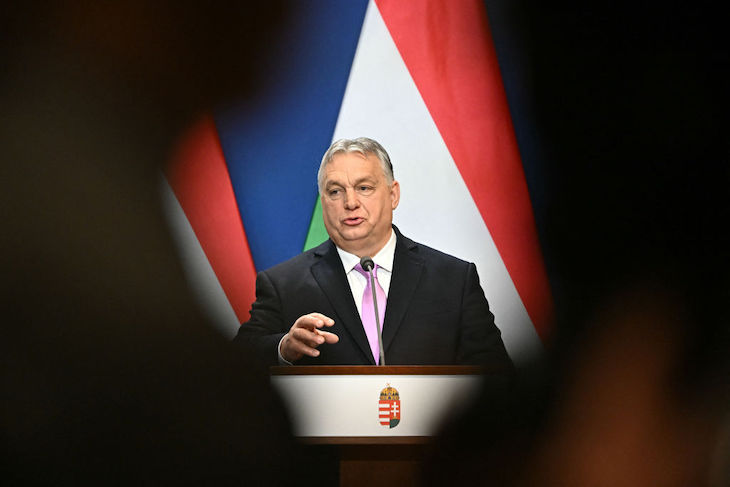Much of the criticism directed at Viktor Orbán, Hungary’s long-serving populist prime minister, is richly deserved. Orbán poses as the bête noire of the EU, despite Hungary being a net recipient of EU largesse. Another source of the opprobrium directed against Orbán is his opposition to aiding Ukraine in its existential war against Russia. This is downright indecent for someone who, as a handsome young political firebrand in 1989, helped to end Soviet control of Hungary. Has Orbán forgotten, now that he is grey-haired and rather porky, what it means to yearn for your country’s freedom and independence? Continued access to cheap Russian gas and oil just isn’t a good enough reason to suck up to the despot in the Kremlin.
Orbán’s opponents say that Soros is singled out because he is Jewish. This isn’t the case
But Orbán gets flak for something else, and in that case unjustly: he is not, as has been claimed by his critics, anti-Semitic. This accusation stems, in large part, from his hostility towards the (Jewish) billionaire George Soros. The Hungarian government under Orbán has been accused of using anti-Semitic tropes as part of its criticism of Soros. In 2019, the European Commission accused Orbán’s government of propagating a ‘shocking’ and ‘ludicrous conspiracy theory’, after Hungary launched a poster campaign featuring Soros alongside Jean-Claude Juncker, who was then EU Commission president. It returned to the theme last November, when it launched a poster campaign against Alex Soros, George’s son and the current chair of the Open Society Foundations, with the slogan: ‘Let’s not dance to their tune’.
Orbán’s opponents say that Soros is singled out because he is Jewish. This isn’t the case. When Orban criticised Soros in 2015, the billionaire responded by clarifying the difference between the two men: ‘(Orban’s) plan treats the protection of national borders as the objective and the refugees as an obstacle. Our plan treats the protection of refugees as the objective and national borders as the obstacle.’
Is it not legitimate for Orban to criticise Soros, a man whose views clearly stand in stark contrast to the Hungarian leader’s? Orbán’s supporters argue that Hungary’s president is no anti-Semite, and that his opposition against Soros is ideological. As they see it, Soros is interfering in the internal affairs of his country and should not, as a result, be above criticism; his religion is immaterial. Orbán also insists that his government has a policy of ‘zero tolerance when it comes to anti-Semitism and racism’.
Orbán, of course, was involved in the establishment of the Holocaust Memorial Centre in Budapest back in 1999, during his first tenure as PM. The following year, he instituted the annual Day of Remembrance for the Hungarian Victims of the Holocaust (on 16 April). Budapest, the city where I was born and where I return often, has a thriving Jewish community of just under 50,000, still centred around the old Jewish quarter. There you can find the largest and grandest synagogue in Europe, now beautifully restored. And the city hosts an annual Jewish Cultural Festival.
It’s plain to see that Budapest is a friendly capital for Jews. Once, when I was there in September, around the time of Rosh Hashanah, I passed a huge banner on the side of a bridge wishing the Jewish community a happy holiday. Not likely to happen in London or Paris, is it?
A number of my friends and contacts in Budapest are Jewish, and while I’ve heard them disparage some of Orbán’s policy decisions (lavishing money on new football stadiums, for example, while underfunding hospitals), none has ever accused him of anti-Semitism. The views of my Jewish friend Vera, who has spent her long life in publishing, originally as an editor and latterly as a translator, are fairly typical. ‘Why would he have anything against a community which has always contributed so much to the country, culturally, intellectually, economically?’ she says. ‘I think he really values us.’
The real test to how a government values its Jewish community has come in the wake of Hamas’s 7 October massacre of Israelis and the resulting war in Gaza. Vociferous, often threatening pro-Palestinian marches and demonstrations have taken place in many Western cities, with London’s weekly street takeovers among the worst. Jews in London have felt intimidated and unsafe. Pupils at our Jewish schools have been warned not to wear identifiable school uniforms in order to avoid being targeted. What a disgrace in our liberal democracy.
But what about Hungary, proudly described by Orbán as an ‘illiberal democracy’? When he learned, soon after the massacre, of a planned demonstration called Stand With Gaza to be held in front of the Ministry of Foreign Affairs in Budapest, he immediately banned it. ‘Pro-terrorist demonstrations are not allowed in Hungary,’ he announced. On the other hand, the government did approve the display of a giant Israeli flag surrounded by lights in Budapest’s iconic Heroes’ Square.
The truth is, Orbán doesn’t need me to defend him against the charge of anti-Semitism, when he’s got the Chief Rabbi of Budapest, Zoltán Radnóti on side. He has stated publicly that, if Hungarian Jews live in safety and security, it’s thanks to the PM: ‘Because he keeps the borders closed, there are hardly any pro-Palestinian people in Budapest. There is no threat of attacks. It is better here than in, say, Berlin, Paris, Brussels and Stockholm, where it is less safe for Jews. Budapest is an island in Europe, without Muslim fundamentalists.’ Case closed.
Monica Porter was born in Budapest
Got something to add? Join the discussion and comment below.
Get 10 issues for just $10
Subscribe to The Spectator Australia today for the next 10 magazine issues, plus full online access, for just $10.



















Comments
Don't miss out
Join the conversation with other Spectator Australia readers. Subscribe to leave a comment.
SUBSCRIBEAlready a subscriber? Log in